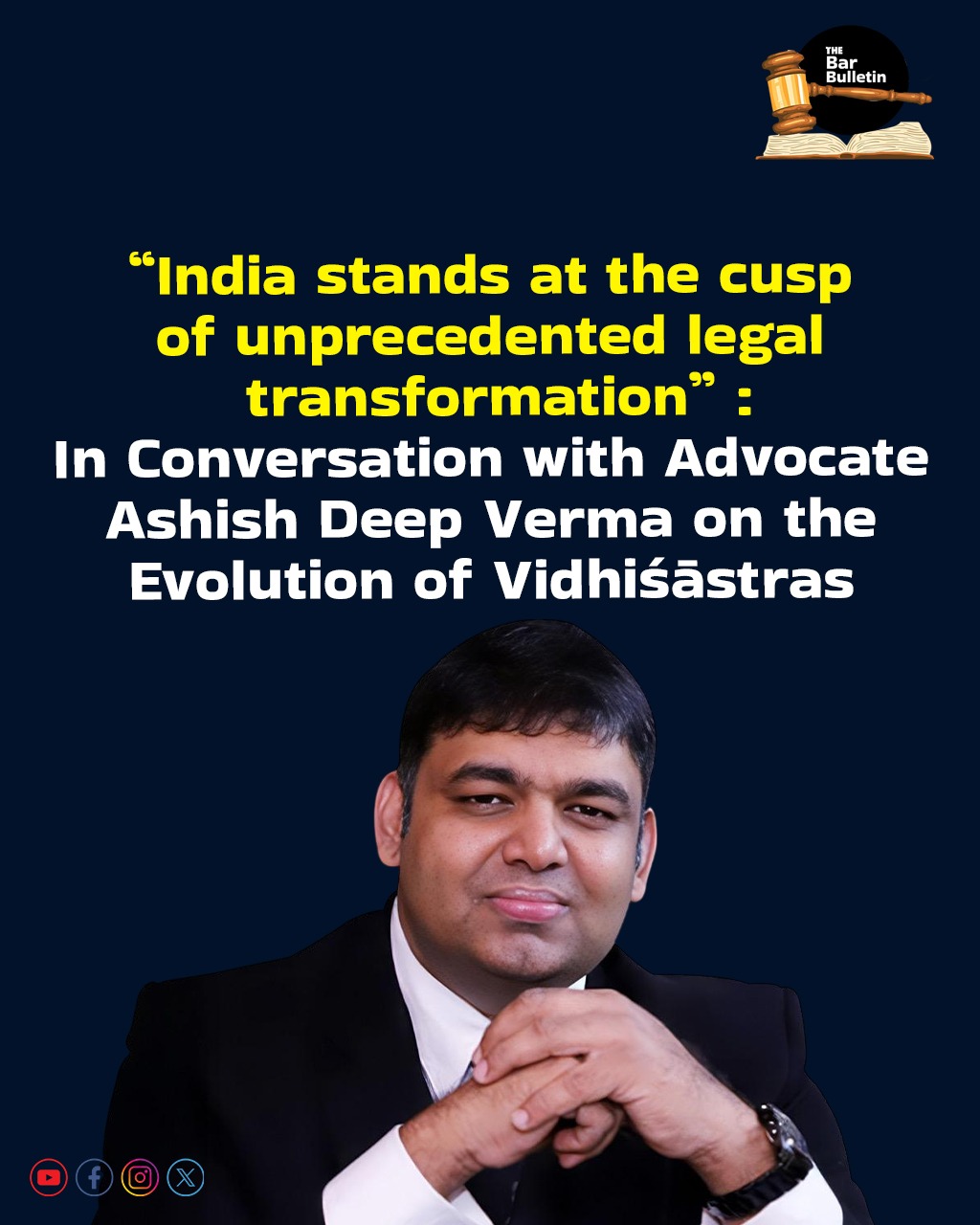Advocate Ashish Deep Verma is the Founder and Managing Partner of Vidhisastras – Advocates & Solicitors, a law firm dedicated to offering business-oriented advice and prompt assistance to address legal as well as quasi-legal challenges. Mr. Verma is a committed legal professional with over a decade of experience in delivering result-oriented legal solutions across various jurisdictions and domains.
1. Could you share your professional journey with us so far?
My journey has been a continuum of legal learning with practical experience and applied practice at law. With a sound academic background, I transitioned into advocacy with an enduring belief that law is not merely a profession but an apparatus for social engineering. Over the years, my practice has expanded across diverse jurisdictions and subject matters, from conventional civil and commercial disputes to emerging domains like blockchain and technology law. Each step has been guided by a vision of bridging doctrinal purity with pragmatic solutions for clients in India and abroad.
2. What inspired you to start Vidhisastras back in 2011, and how has that original vision evolved over time?
Vidhisastras was conceived in 2011 with the aspiration to establish a platform that harmonises tradition with innovation. The original vision was to render legal services with an academic depth while maintaining commercial relevance. Over time, that vision has evolved into a truly international outlook where our role is not limited to providing counsel but also in shaping discourse, advancing comparative jurisprudence, and building legal infrastructures in new industries like technology and cross-border trade.
3. Your firm spans multiple practice areas and geographies—how do you maintain consistency and excell
Consistency and excellence are cultivated through a combination of systems and culture. We institutionalise robust knowledge management practices while ensuring that each mandate benefits from accumulated intellectual capital. Equally, we invest heavily in capacity-building of our associates, encouraging them to pursue in-depth analysis of legal challenges along with global exposure. This dual approach ensures that whether the matter is in Delhi, Dubai, or Dublin, the client experiences the same standard of rigorous analysis and result-oriented advocacy.
4. You have been recognized for advancing blockchain technology education. What sparked your interest in this area, and how do you see it shaping the future of law?
My interest in blockchain was ignited by its potential to fundamentally restructure the way we conceive of Trust, Record-keeping, and Enforcement. From smart contracts to decentralized dispute resolution, blockchain poses both challenges and opportunities for traditional legal frameworks. I see the future of law being reshaped by such technologies, compelling jurists to rethink doctrines of contract, property, and even constitutional rights. By contributing to blockchain education, I aim to equip the legal fraternity with the foresight to regulate without stifling innovation.
5. What have been the most pivotal lessons from building international collaborations for Vidhisastras?
The most critical lesson is that international collaborations require cultural sensitivity as much as legal acumen. While the substantive law may differ across jurisdictions, the values of trust, transparency, and respect are universal. Building such collaborations has reinforced the importance of adaptability and the need to contextualize legal advice to the business and regulatory environment of each jurisdiction. It has also underscored that the strength of any collaboration lies in shared intellectual curiosity rather than transactional convenience.
6. As a leader, how do you foster innovation and a growth mindset within your team?
I believe leadership in law is less about command and more about cultivation. At Vidhisastras, we pursue innovation by encouraging intellectual dissent and cross-disciplinary thinking. A young associate is as empowered to question a doctrine as a senior partner is. By creating a psychologically safe environment, we allow ideas to germinate. Simultaneously, we integrate a growth mindset by linking professional advancement with continuous learning, be it through academic writing, policy engagement, or global exposure.
7. In your view, what are the biggest opportunities and disruptions facing the Indian legal industry in the next decade?
India stands at the cusp of unprecedented legal transformation. The opportunities lie in areas such as technology regulation, arbitration hubs, infrastructure law, and environmental governance. Conversely, disruptions will emanate from AI-driven dispute resolution, cross-border digital taxation, and data sovereignty conflicts. The challenge for the Indian legal fraternity will be to navigate these disruptions not as passive respondents but as proactive architects of frameworks that balance innovation with legitimate values.
8. Looking back, which achievement or moment stands out as most rewarding in your career?
Among the many milestones, what I find most rewarding is witnessing Vidhisastras evolve from a nascent idea into a firm recognized across borders. Personally, my work in advancing blockchain education and its legal intricacies with a viewpoint of established regulations with comparative jurisprudence has been profoundly under process. To see students, young lawyers, and even policymakers benefit from these initiatives has been the truest testament to the purpose with which we have been serving our clients in different corners of the globe.
9. How do you personally stay resilient, inspired, and continuously evolving as a Managing Partner?
Resilience comes from discipline; inspiration from purpose; and evolution from humility to keep learning. I anchor myself through structured routines, engage deeply with academic work, and surround myself with colleagues who challenge me intellectually. Above all, I view law as a living organism that is quite capable of ever-changing, ever-demanding. That recognition ensures I never stagnate but constantly evolve, both as a professional and as a custodian of the institution I lead.

